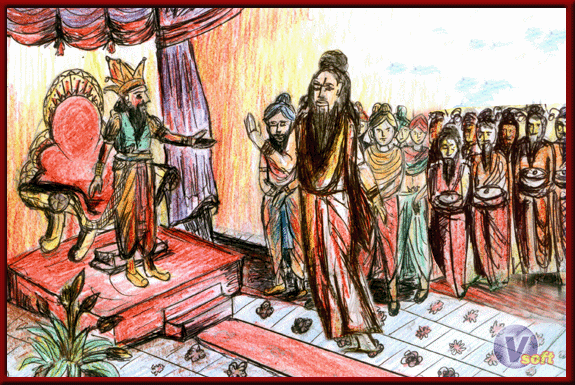270. The Bodhisatta As Kappa

Once upon a time when Brahmadatta was reigning in Benares, the Bodhisatta was born in a brahmin family in the kingdom of Kasi, and they called him young Kappa. When he came of age, he acquired all the arts at Takkasila and afterwards adopted the religious life. At this time an ascetic named Kesava attended by five hundred other ascetics became the teacher of a band of disciples in the Himalayas. The Bodhisatta came to him and becoming the senior of the five hundred pupils, lived there and showed a friendly feeling and affection for Kesava. And they became very intimate one with another.
By and bye Kesava accompanied by these ascetics went to Benares to procure salt and vinegar and lodged in the king’s garden. Next day he went into the city and came to the palace door. When the king saw the band of holy men, he incited them in and fed them in his own house, and exacting the usual promise from them, he lodged them in his garden. So when the rainy season was over, Kesava took leave of the king the king said, “Holy Sir! you are an old man. You live here, and send the young ascetics to the Himalayas.” He agreed and sent them with the head disciple to the Himalayas and himself was left quite alone. Kappa went to the Himalayas and lived there with the ascetics. Kesava was unhappy at being deprived of the society of Kappa, and in his desire to see him got no sleep, and in consequence of losing his sleep, his food was not properly digested. He fell sick and suffered by severe pains. The king treated him with his doctors but could not cure him.
The ascetic asked the king, “Do you wish for me to die or to recover?”
“To recover, Sir,” he answered.
“Then send me to the Himalayas,” he said.
The king called a minister named Narada, and asked him go with some foresters and take the holy man to the Himalayas. Narada took him there and returned home. But by the mere sight of Kappa, Kesava’s mental disorder ceased and his unhappiness subsided. So Kappa gave him broth made of millet and wild rice together with leaves sprinkled with water, without salt and spices, and at that very instant the dysentery was assuaged. The king again sent Narada saying, “Go and find out the position of the ascetic Kesava.” He came and finding him recovered asked Kesava, “Reverend Sir! the king of Benares was treating you with all his band of doctors could not heal your sickness. How did Kappa treat you?” And herewith he uttered the first stanza:
Thou that of late with lord of men didst dwell,
A king prepared to grant thy heart’s desire,
What is the charm of Kappa’s hermit cell
That blessed Kesava should here retire?
Kesava on hearing this repeated the second stanza:
All here is charming: e’en the very trees
O Narada, my fancy take,
And Kappa’s words that never fail to please
A grateful echo in my heart awake.
After these words he said : “Kappa by way of pleasing me gave me to drink broth made of millet and wild rice mixed with leaves sprinkled with water, and without salt and spices, and therewith was my bodily sickness stayed and I was healed.”
Narada, hearing this, repeated the third stanza:
Thou that but now the purest rice didst eat
Boiled with a dainty flavouring of meat,
How can you relish such insipid fare?
And millet and wild rice with hermits share?
On hearing this Kesava uttered the fourth stanza:
The food may coarse dainty prove,
May scanty be or much abound,
Yet if the meal is blessed with love,
Love the best sauce by far is found.
Narada on hearing his words returned to the king and told him, “Kesava says thus and thus.”
The Master, having ended his lesson, identified the Birth: “At that time the king was Ananda, Narada was Sariputta, Kesava was Bakabrahma, Kappa was myself.”


Leave a Reply